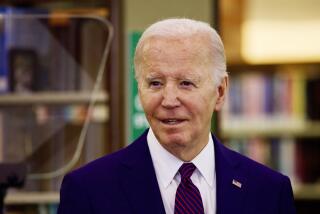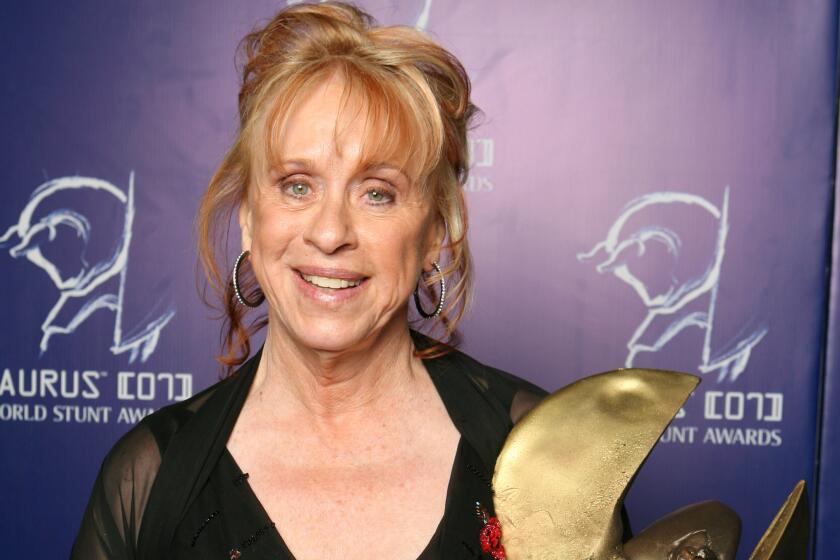Column: UCSF drops affiliation with Catholic hospitals, a victory for reproductive rights
UC San Francisco announced Tuesday that it is dropping plans for an expanded affiliation with Dignity Health, a Catholic hospital chain that places flagrantly discriminatory restrictions on abortions, transgender care and other services.
The decision was announced in a letter to the UCSF community and “concerned citizens” signed by Sam Hawgood, the USCF chancellor, and Mark Laret, CEO of UCSF Health, who had been pushing hard for the plan in presentations to the UC regents.
In a separate statement, the administration said it wouldn’t bring any proposals regarding Dignity Health before the regents at upcoming meetings in June and July. It said the affiliation plan had been “still under discussion and had not been finalized” before the decision was made to abandon it. UCSF said that previous arrangements with Dignity hospitals in the Bay Area, which dealt with clinical programs on a limited scale, would continue.
We’ve heard a growing chorus of concern from multiple stakeholders...in light of the passage of very severe anti-abortion legislation in many states.
— Vanessa Jacoby, UCSF obstetrics faculty
In an emailed statement, Dignity Health said, “We have heard and understand the concerns raised by UCSF faculty and others relating to the proposed partnership between Dignity Health and UCSF Health, and agree that we cannot move forward with the partnership as originally planned.”
The decision reflects concerns that had been raised among UCSF medical professionals and advocates for women’s healthcare and LGBTQ advocates about the proposed affiliation. The deal would have tightened UCSF’s relationship with Dignity’s four Bay Area hospitals — Dominican Hospital in Santa Cruz, Sequoia Hospital in Redwood City, and St. Francis Memorial and St. Mary’s Medical Center in San Francisco.
As we’ve been reporting, those concerns stemmed from Dignity’s adherence to Catholic Church dictates regarding women’s reproductive healthcare and transgender services, among others. St. Mary’s and Dominican are designated as Catholic hospitals subject to the Ethical and Religious Directives for Catholic Health Care Service, known as ERDs.
The ERDs, a creation of the U.S. Conference of Catholic Bishops, ban “direct abortions,” in vitro fertilization, contraception, assisted suicide and “gender-affirming care” such as hormone treatments and surgeries for transgender patients. They treat life as beginning from the moment of conception. (“Direct abortion” is not a medical but a Catholic term, signifying the termination of a pregnancy by destroying a developing fetus anytime after conception.) They vest the ultimate judgments about whether to allow those services, even in emergencies, to local bishops rather than doctors.
Sequoia and St. Francis are designated as non-Catholic hospitals within Dignity Health. They are subject to the church’s less restrictive “statement of common values,” which bars “direct abortions,” physician-assisted suicide and fertility treatments such as in vitro fertilization — the only way, as the petition states, that gay and lesbian couples can conceive a biological child — but allow some other services banned by the ERDs.
The proposed affiliation with the Catholic healthcare system threatened to place UCSF on the wrong side of the movement for women’s reproductive health and transgender rights—especially as those those rights face attack across the nation.
“We’ve heard a growing chorus of concern from multiple stakeholders over the last several weeks,” Vanessa Jacoby, an associate OB-GYN professor at UCSF and a leading opponent of the proposal, “particularly in light of the passage of very severe anti-abortion legislation in many states and the stripping down of transgender anti-discrimination protections by the [Trump] administration.”
Alabama, Georgia, Mississippi, Missouri and Ohio, among other states, have enacted strict limits on abortion in recent weeks. The administration last week proposed rolling back Obama-era rules that forbid discrimination based on gender identity. The change would allow healthcare providers to refuse to provide gender reassignment surgery and might allow insurers to refuse to cover the procedure.
“What may have been theoretical in peoples’ minds has become a reality in terms of encroachments on women’s reproductive health and protections for transgender people,” Jacoby told me.
What remains unclear from the statements by UCSF and Dignity is whether the would-be partners will try to refashion their plan and present it to the regents in a new form. “We will work to find a new path forward,” UCSF said. Dignity’s statement, which qualified Tuesday’s action as the end of the proposal “as originally planned,” said further that “going forward we will explore ways to work together.”
UCSF administrators had insisted that faculty members would face no constraints on their treatment of patients at Dignity hospitals. “We were not considering a merger or any arrangement in which Dignity Health would have had a role at UCSF’s facilities,” UCSF said Tuesday.
But doubts about the affiliation applied to UCSF activities at facilities run by Dignity, not UCSF. As Tuesday’s statement acknowledged, the specific terms of the proposed arrangement were never finalized and no details were ever made public. As a result, it is impossible to assess how doctors’ ability to counsel and treat their patients without interference would have been safeguarded.
In any event, UCSF officials acknowledged that patients requiring services barred by Catholic rules might have to be transferred out of the Dignity hospitals to receive them. UCSF personnel might even have to resort to subterfuge to provide some services to patients, they acknowledged. Any nonmedical interference with doctors’ judgments, critics of the plan argued, would increase health hazards for UCSF patients.
The affiliation proposal split the faculty at UCSF, the premier medical teaching institution of the University of California. UCSF administrators asserted that the affiliation was necessary to alleviate a capacity shortage at the university’s medical center, which says it had to turn away 855 patient transfers last year for lack of available beds.
More than 1,500 faculty members, alumni, students and others signed a petition urging the administration to drop the plan, however. Several faculty members raised questions about the arrangement to the regents’ health services committee in April and December and at a meeting of the full regents board in early May.
The proposed affiliation underscored issues associated with the expanding influence exercised over U.S. healthcare by Catholic hospitals, which today account for one out of six of all hospital beds. In some communities — including some in California — alternatives to Catholic hospitals are geographically inaccessible. That can place legal medical procedures such as abortions and sterilizations effectively out of reach for many patients.
The plan’s critics argued that the affiliation, whatever its terms, placed the university in the unacceptable position of accepting a discriminatory model in its practice of medicine. The arrangement would enhance the church’s ability to promulgate its nonmedical strictures on care, Jacoby warned.
No amount of interaction between UCSF and Dignity Health would ever influence the Catholic institutions to relax their restrictions, Jacoby said. “They never compromise their values,” she said. “They’re not allowed to change. They’ll never provide contraceptives. They’ll never do an abortion to our standard of care.”
Keep up to date with Michael Hiltzik. Follow @hiltzikm on Twitter, see his Facebook page, or email michael.hiltzik@latimes.com.
Return to Michael Hiltzik’s blog.







